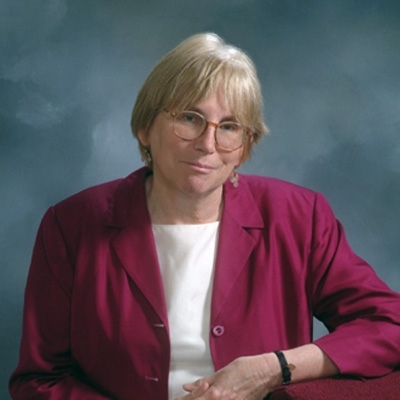For her groundbreaking work explaining how enzymes — proteins that act as catalysts to speed up reactions millions-fold — have evolved to carry out difficult and ingenious chemistry critical to life, MIT Professor JoAnne Stubbe was today named co-winner of the Welch Award in Chemistry.
Stubbe shares the award with Christopher Walsh, a professor at Harvard Medical School and former member of the MIT faculty, where he chaired the chemistry department. She is the second MIT faculty member to win the award, after Alexander Rich, who won in 2008.
Stubbe, the Novartis Professor of Chemistry and Biology, has focused most of her career studying the mechanisms of enzymes involved in nucleotide metabolism, central to the biosynthesis of DNA and RNA. Her success in unraveling the specific steps in enzymatic reactions over the past four decades has had profound impacts on fields ranging from cancer-drug development to synthesis of biodegradable plastics.
Her most noted work, for which she was awarded the National Medal of Science last year, involves a key class of enzymes that play an essential role in DNA replication and repair. She discovered how those enzymes, called ribonucleotide reductases, use free-radical chemistry to convert the monomeric RNA building blocks (nucleotides) to the monomeric DNA building blocks (deoxynucleotides), essential to make and repair DNA.
Stubbe’s detailing of this nucleotide reduction process has led to the design of mechanism-based inhibitors; one of these is the drug gemcitabine, used clinically in the treatment of advanced pancreatic cancer and non-small cell lung carcinomas.
The Welch Foundation, based in Houston, is one of the nation's oldest and largest sources of private funding for basic research in chemistry. It will present the $300,000 award and gold medallion to Stubbe and Walsh at the foundation’s annual conference in October.
“I am honored to receive the Welch Award, but I couldn’t have done any of this without many creative collaborators and my outstanding and creative students and postdocs,” said Stubbe. “I have always been fascinated by how nature has evolved over millions of years to do these very tough chemical reactions. Enzymes do a lot of pretty cool things and I love discovering exactly how they do it.”
Born in Champaign, Ill., Stubbe earned her BS in chemistry from the University of Pennsylvania and her doctorate from the University of California, Berkeley. She taught at Williams College before returning to research at Brandeis (working as postdoc in 1995 Welch Award recipient Robert Abeles’ lab), Yale and the University of Wisconsin-Madison. She joined the MIT faculty in 1987, recruited by co-recipient Walsh.
Walsh began his career at MIT with studies of “suicide substrates,” a class of enzyme inactivators with major implications for how drugs work. After 15 years at MIT, he has spent the last 22 years at Harvard Medical School, where he now studies the biosynthesis of natural product antibiotics and the chemical logic and enzymatic machinery of how they are made, in order to identify new antibiotics, antitumor agents and immunosuppressants and to improve the efficiency of production.
Stubbe shares the award with Christopher Walsh, a professor at Harvard Medical School and former member of the MIT faculty, where he chaired the chemistry department. She is the second MIT faculty member to win the award, after Alexander Rich, who won in 2008.
Stubbe, the Novartis Professor of Chemistry and Biology, has focused most of her career studying the mechanisms of enzymes involved in nucleotide metabolism, central to the biosynthesis of DNA and RNA. Her success in unraveling the specific steps in enzymatic reactions over the past four decades has had profound impacts on fields ranging from cancer-drug development to synthesis of biodegradable plastics.
Her most noted work, for which she was awarded the National Medal of Science last year, involves a key class of enzymes that play an essential role in DNA replication and repair. She discovered how those enzymes, called ribonucleotide reductases, use free-radical chemistry to convert the monomeric RNA building blocks (nucleotides) to the monomeric DNA building blocks (deoxynucleotides), essential to make and repair DNA.
Stubbe’s detailing of this nucleotide reduction process has led to the design of mechanism-based inhibitors; one of these is the drug gemcitabine, used clinically in the treatment of advanced pancreatic cancer and non-small cell lung carcinomas.
The Welch Foundation, based in Houston, is one of the nation's oldest and largest sources of private funding for basic research in chemistry. It will present the $300,000 award and gold medallion to Stubbe and Walsh at the foundation’s annual conference in October.
“I am honored to receive the Welch Award, but I couldn’t have done any of this without many creative collaborators and my outstanding and creative students and postdocs,” said Stubbe. “I have always been fascinated by how nature has evolved over millions of years to do these very tough chemical reactions. Enzymes do a lot of pretty cool things and I love discovering exactly how they do it.”
Born in Champaign, Ill., Stubbe earned her BS in chemistry from the University of Pennsylvania and her doctorate from the University of California, Berkeley. She taught at Williams College before returning to research at Brandeis (working as postdoc in 1995 Welch Award recipient Robert Abeles’ lab), Yale and the University of Wisconsin-Madison. She joined the MIT faculty in 1987, recruited by co-recipient Walsh.
Walsh began his career at MIT with studies of “suicide substrates,” a class of enzyme inactivators with major implications for how drugs work. After 15 years at MIT, he has spent the last 22 years at Harvard Medical School, where he now studies the biosynthesis of natural product antibiotics and the chemical logic and enzymatic machinery of how they are made, in order to identify new antibiotics, antitumor agents and immunosuppressants and to improve the efficiency of production.






